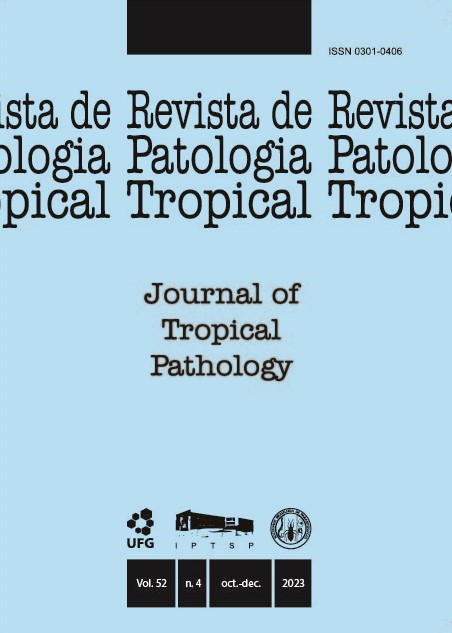The effect of synergistic Candida albicans infection with P63 protein expression on the development of oral carcinom
DOI:
https://doi.org/10.5216/rpt.v52i4.78140Resumo
Oral cancer accounts for 2-4% of all cancer cases. There is compelling evidence that suggest that Candida may influence the development of oral cancer by interfering with the expression of the Tp63 gene, which is crucial for tumor progression, and promotes proliferation. The goal was to assess the p63 expression, compare it qualitatively and quantitatively in a normal buccal mucosa, epithelial dysplasia, leukoplakia, and oral squamous cell carcinoma (OSCC), and also determine how does it relate to the Candida albicans infection. A retrospective cross-sectional study of 100 Formalin-Fixed Paraffin-Embedded (FFPE) cases and controls were studied, and they were divided into four groups: Group I, included 40 controls with normal oral mucosa; Group II, included 20 cases of dysplasia; Group III, included 20 cases of leukoplakia, and Group IV, included 20 cases of OSCC. C. albicans was examined by Real-Time PCR based on Erg11 gene and the immunohistochemical expression of p63 protein. Significant overexpression of p63 and positive PCR results of C. albicans were seen in noninvasive lesions (leukoplakia, epithelial dysplasia) and invasive OSCCs with an increased suprabasal expression in cases of leukoplakia and epithelial dysplasia. The mean of labeling index (LI) of p63 with C. albicans positive cases were found to be in increasing order from normal oral mucosa than leukoplakia and dysplasia to OSCC. These findings point to p63 association with oral carcinogenesis and candidal infection, and they also imply that dysplastic and leukoplakia lesions may have the ability to serve as a signal for oral premalignancy due to increased LI and higher suprabasal expression of this gene.
KEY WORDS: Candida albicans; epithelial dysplasia; Erg11; leukoplakia; p63 protein.
Downloads
Downloads
Publicado
Como Citar
Edição
Seção
Licença
The manuscript submission must be accompanied by a letter signed by all authors stating their full name and email address, confirming that the manuscript or part of it has not been published or is under consideration for publication elsewhere, and agreeing to transfer copyright in all media and formats for Journal of Tropical Pathology.

